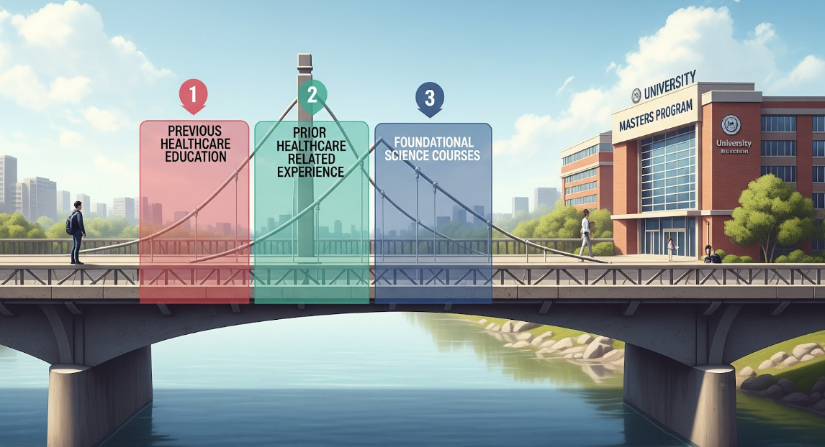A Helping Bridge
The UAHCS Bridging Program (BP), is designed for healthcare practitioners who DO NOT have an undergraduate university degree. As the name suggests, the BP offers a “bridge” or “fast track” to enter into one of our UAHCS Master level programs.
Real-world experience is the most valuable education one can acquire; however, it often goes unrecognized in traditional academic settings. At UAHCS, we are committed to changing that narrative! We believe that every moment spent in the field is an opportunity for learning and growth. Our innovative programs are designed to acknowledge and credit your real-life experiences, empowering you to advance your career while leveraging the knowledge you've gained on the front lines of healthcare. Join us in redefining education and unlocking the full potential of your professional journey!"
The program consists of 90 credits that are awarded in 3 areas:
1. Prior healthcare education (maximum of 30 credits can be awarded)
2. Previous healthcare-related work experience (maximum of 30 credits can be awarded)
3. Successful completion of UAHCS Foundational Science Courses (remaining credits to reach 90 total credits)
Our program is the only program that recognizes previous healthcare education and prior healthcare related experience; fulfilling 2 out 3 of the Bridging Program requirements.

Foundational Science Courses:
Foundational Science Courses are the 3rd stage and are an integral part of the UAHCS Bridging Programme (BP).
Successfully completion of your Foundational Science courses, the final step in the Bridging Program, will allow you direct access to enrol in one of UAHCS Master programs.
The UAHCS Bridging Program requires all students to complete our “Intro to Evidence-based Healthcare Approach” course.
There is an enormous amount of information, misinformation, poorly constructed and or poorly executed research studies related to healthcare. It can be extremely daunting to know which way to turn for accurate and relevant information. This course will arm you with the critical thinking and appraisal skills necessary to identify, analyze, critique and effectively utilize evidenced-based research to further your healthcare practice.
All of our Foundational Science Courses are divided into 3 Learning Areas:
1. Contact Learning (lectures and videos.)
2. Directed Learning (videos, articles, text we suggest you watch our read.)
3. Self-Directed Learning (you dive deeper into areas you are interested in or need more time to understand.)
All of our courses come with a:
- Course Descriptor
- Intro info
- Lectures
- Lecture Resource materials including - Learning Outcomes (Objectives), Key Learning Points and practice Multiple Choice Questions to test your new knowledge.
- Assignments
- Recommended Readings
- Course Exam
If your course contains content from an external collaborator (this will be clearly outlined in the Course Descriptor and Intro), you will be provided with the login information you need to access by the external collaborators - so please watch for an email from them.
Admission Requirements and Application Process
Eligibility
- Any healthcare professional without a University Degree (Registered Massage Therapist, Osteopath, Naturopath, Personal Trainer, Reflexologist, Acupuncturist, etc).
- Any person with a non-healthcare related University Degree.
- Proof of healthcare designation, university degree and/or college diploma are required.
Credit Transfer
- Already completed a certification related to your Master's program? You may be eligible for credit transfer. We'll verify this with you during the application process.

Why UAHCS?
Developed by Healthcare Providers, For Healthcare Providers
• Earning a living as a healthcare professional is never easy, and there is never enough time in the day.
• Our programs are all online and asynchronous - allowing you to learn where and when you want.
• You can also apply for credit transfer if you have taken (and completed) any of our content previously.
Your Experience Counts—In Class and in Practice
We are the only online university to offer a comprehensive bridging program that grants credit for both your prior healthcare education and your work experience.
Win. Win. Win. It's That Simple
• Enhance your career and practice opportunities.
• Completely customise your program.
• Study on your terms. Start when you want. Work at your pace. Work when and where you want.
Content
Introduction to Evidence-Based Health Care (UAHCS Credits: 5)
This master's-level course provides the essential foundation for modern, evidence-based healthcare—where clinical expertise, patient values, and the best available research intersect to drive optimal outcomes.
Across 10 transformative lectures, you'll move beyond passive learning to develop advanced skills in:
- Critical appraisal and evidence synthesis
- Navigating clinical uncertainty with confidence
- Applying research to improve safety, effectiveness, and quality of care
You’ll gain the knowledge and practical competencies needed to lead healthcare transformation rooted in scientific rigor, while promoting patient-centered, evidence-driven practice at every level.
1. MSK Anatomy 1 (Bones) (UAHCS Credits: 5)
The MSK Anatomy 1 (Bones) course introduces students to bone and skeletal anatomy, including cartilage and ligaments.
The course features 15 lectures, systematically introducing the foundations of skeletal anatomy; Including the bone structure, key landmarks and growth & development. You will journey through the body starting with the bones of the skull and face, continuing down the spine and into both the upper and lower extremities.
2. MSK Anatomy 2 (Joints) (UAHCS Credits: 5)
Throughout the MSK Anatomy 2 course, you will explore various joints - from the intricate joints of the skull and face to the major joints of the appendicular skeleton, including the shoulder girdle, hip, knee, and ankle.
The course consists of 15 lectures (+ 1 Medical Abbreviations List), introducing to the foundations of Skeletal Anatomy, in a systematic step by step approach.
3. MSK Anatomy 3 (Muscles and Muscle Testing) (UAHCS Credits: 10)
In the MSK Anatomy 3 (Muscles and Muscle Testing - MT), students are introduced to muscle anatomy, physiology and manual muscle testing.
The course consists of 3 UAHCS lectures, introducing you to muscles and the foundations of muscle testing. You then switch over to ProHealth Systems material on their site and complete their Evidence-informed Muscle Testing and Function.
The PHS material covers manual muscle testing of 8 regions of the body. After each region, you will be given a PHS multiple choice test for that region. After successful completion of all 8 regions, you will receive a Professional Certification from PHS - Evidence-informed Muscle Testing and Function.
4. Neuroanatomy (Intro Mini Course) (UAHCS Credits: 5)
The Neuroanatomy (Mini Course) is a foundational science course designed to introduce students to the basic concepts of neural anatomy and physiology.
You will travel through 10 courses introducing you to neural structure, function, communication and regeneration. You will also be introduced to the structure and organization of the nervous system.
5. Health Advocacy (UAHCS Credits: 5)
This bridging module prepares students for master’s-level studies by building core knowledge, skills, and attitudes rooted in a salutogenic, health-focused approach. You'll strengthen your ability to lead patient-centered care, support lifelong learning, and advance your career.
Through evidence-informed problem-solving and real-world application, you'll learn to:
- Advocate for community-driven health initiatives
- Lead across differences and influence policy
- Promote equity by centering those most affected by health disparities
This course lays the foundation for impactful clinical practice and transformative healthcare leadership.
6. Heath Professionalism (UAHCS Credits: 5)
This course explores the moral foundation of modern healthcare, equipping you to navigate complex clinical decisions, interprofessional dynamics, and systemic challenges with integrity.
Across 20 in-depth lectures, you’ll develop:
- Advanced moral reasoning and ethical decision-making skills
- The ability to address systemic inequities and promote justice
- A commitment to professional excellence and patient-centered care
Move beyond rule-based compliance to become a transformative leader who upholds patient autonomy and advances the healing mission of healthcare.
7. Community Health (UAHCS Credits: 5)
This master's-level course shifts the focus from reactive care to evidence-based strategies that extend health-span and promote lifelong well-being.
Across 20 lectures, you’ll gain cutting-edge scientific knowledge, analytical skills, and practical tools to:
- Design and lead population-level interventions
- Navigate complex health systems
- Promote health equity and address root causes of disparities
Prepare to lead transformative public health initiatives that prioritize prevention, sustainability, and proactive health creation.
1. Neurophysiology (Full course) (UAHCS Credits: 10)
This comprehensive, advanced-level foundational course introduces students to basic and advanced concepts of neural anatomy, physiology, neural pathways, and processing. It is an integral part of the UAHCS Bridging Programme (BP), and successful completion will grant direct access to enrollment in a UAHCS Master's program.
The course consists of 4 Parts:
Part 1 - Introductory level discusses neural structure and organization, electric impulses and synapses. (Note: This material is also covered in the Neuroanatomy (Intro Mini course).
Part 2 - Introduces sense perception and special senses.
Part 3 - Introduces the spinal cord and neural tracks.
Part 4 - Introduces the regions of the brain.
2. MSK Diagnosis and Best Practice (UAHCS Credits: 10)
In the MSK Diagnosis and Best Practices course students are introduced to basic identification, diagnosis and therapeutic treatment of MSK conditions and injuries.
The course is 100% provided by ProHealth Systems (PHS).
You will complete their Evidence-informed MSK DDx and Best Practices Certification course and therefore also earn a PHS Professional Certification in Evidence-informed MSK DDx and Best Practices.
3. Evidenced - Based Healthcare Approach (Full Advanced Course) (UAHCS Credits: 10)
This master's-level course equips you with the advanced knowledge, critical thinking, and practical skills needed to lead evidence-based care in today’s complex healthcare environments.
Across 20 transformative lectures, you’ll learn to:
- Critically evaluate and apply research evidence
- Integrate clinical expertise with patient values
- Overcome implementation barriers in real-world settings
Move beyond simply “looking up research” and become a leader in delivering scientifically rigorous, patient-centered care.